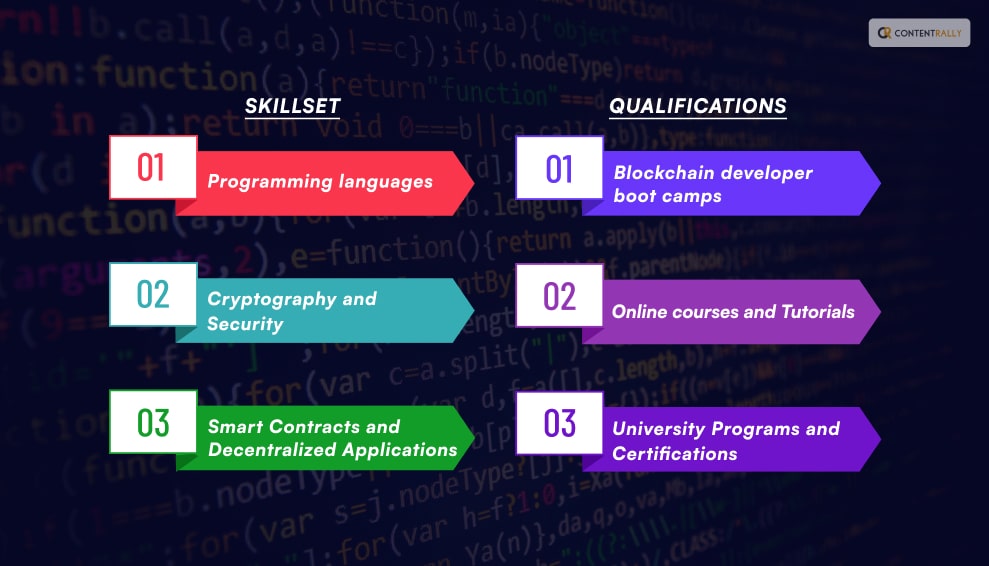Well, are you planning to become a blockchain developer? In this case, you must be passionate about cryptography, coding, and Blockchain technology. This means you might be curious to combine such interests and wonder how to become a blockchain developer.
Above all, blockchain technology is about reshaping how we interact, exchange, and transact information online. With such immense potential, a wide range of industries are transforming.
After a long research, I have developed some factors for becoming a blockchain developer. A blockchain developer is mainly like a data scientist. In this case, you would get an overview of becoming a blockchain developer. Of course, this includes essential skills, several training options, education, and multiple career opportunities.
Skills and Qualifications

Blockchain technology has been gaining popularity over the last few years. Not only that, but the blockchain developer industry needs candidates who can design well and know how to develop and maintain the significance and usage of multiple blockchain-based apps. Below, I will discuss the skills and qualifications of a blockchain developer in 2024.
1) Programming languages
One of the most significant skills you need as a blockchain developer is knowing about programming languages. Ensure that, as a blockchain developer, you have an in-depth understanding of several programming languages.
Some of the commonly used in the Blockchain development industry are Python, JavaScript, and Go. Above all, these programming languages can help you to create effective and efficient blockchain applications. So that you, as a blockchain developer, can handle a large set of data and transactions.
2) Cryptography and Security
Blockchain is such an important built on the foundation of cryptography. As a blockchain developer, you must understand the science of encrypting and decrypting data. Furthermore, as a blockchain developer, you must know and understand several other cryptographic protocols.
Additionally, security is a significant and crucial aspect of blockchain development. This is an essential part of being aware of blockchain security best practices, and you can have an in-depth understanding of how to incorporate access controls and other security measures to build securely and safely.
3) Smart Contracts and Decentralized Applications
Smart Contracts are self-executing computer programs that would automate contract terms between parties. Above all, multiple smart contracts are such a critical component, especially of several blockchain-based applications.
In this case, they help automate the procedures like artificial intelligence architect, ensuring the transactions are complete. These are mainly conducted in a decentralized, translucent, and secure manner.
DApps are applications that run on the Blockchain. Above all, these are not controlled by any central authority. To be a blockchain developer, you must be skilled at developing, designing, and testing such intelligent contracts. After all, DApps are secure, user-friendly, and reliable.
Qualifications:
1) Blockchain developer boot camps
If you want a more immersive and intensive learning experience, do a blockchain developer boot camp. Virtual boot camps are such a significant and excellent starting point that you would get hands-on building experience. After all, professional engineers are also required to provide essential guidance.
2) Online courses and Tutorials
There are numerous online courses and other tutorials that can help you get started. This would apply to your path and help you become a blockchain developer.
Websites like Udemy, Coursera, and Code Academy recently offered several courses on Blockchain technology. These courses range from free introductory courses to more advanced courses on blockchain technology.
3) University Programs and Certifications
Several universities offer Blockchain-related programs and other certifications. In this case, these programs range from undergraduate and graduate degrees, especially in engineering and computer science. Some universities provide blockchain courses and programs, such as Yale University, UC Berkeley, NTU Singapore, etc.
Responsibilities

To become a blockchain developer, leverage their cryptography, programming, and other distributed systems expertise. Below, I will discuss several of the responsibilities of a blockchain developer.
- Being a blockchain developer, you must know how to design and incorporate intelligent contracts. You not only need self-contracts, but you also must know about self-executing contracts with other predefined rules that are encoded on the Blockchain.
- Blockchain developers contribute to the development of Blockchain protocols. On the other hand, being a blockchain developer, you must understand such rules and other consensus mechanisms that govern blockchain networks.
- Another significant responsibility of a blockchain developer is to build decentralized applications. This would run on multiple blockchain networks. These dApps span various domains, including finance, supply chain management, and many others.
- Recently, Blockchain developers have conducted security audits, which help you identify several other vulnerabilities. Furthermore, this would also ensure the resilience and integrity of blockchain systems. They incorporate such best practices to secure coding, key management, and encryption to shield against cyber hacks and threats.
Tools and Technologies

It can be exciting and lucrative if you plan to pursue your career in the Blockchain industry. However, this is important for becoming a successful blockchain developer. Below, I will discuss the tools and technologies that blockchain developers use.
1) Solidity
Solidity is one of the most crucial and most used software a blockchain developer can use. This software tool was created to target the Ethereum Virtual Machine, and C++, JavaScript, and Python influenced this. Aside from that, Solidity supports the OOP paradigm, and cis is another crucial language, especially for creating such intelligent contracts. Blockchain developers can create such applications to perform the self-enforcing business logic to contain the smart contracts.
2) MetaMask
A Chrome Extension that could communicate with dApps is known as MetaMask. In this case, users can quickly receive and send such digital assets by using this open-source and decentralized wallet. Aside from that, this is simple to use and has many beneficial features, which MetaMask has recently surpassed all other dApps browsers.
3) Truffle
As a blockchain developer, Truffle is one of the most essential software if you are looking for an Ethereum programming environment, asset pipeline, and testing framework. Aside from that, this is a famous tool among other developers because it allows them to combine easily, interact, deploy, and so many others. Even more, this is one of the most prominent tools in the entire cryptocurrency world.
4) Remix IDE
Another well-known blockchain tool that a blockchain developer uses is Remix IDE. Moreover, this browser-focused blockchain development tool assists in creating and deploying several other smart contracts.
Challenges And Solutions

As we know, blockchain technology has evolved in recent years. That is why blockchain developers have faced multiple challenges and solutions. Below, I will discuss a blockchain developer’s challenges and solutions.
1) Decentralization
One of the most significant reasons the blockchain industry uses blockchains is decentralization. In this case, the transactions are confirmed by a set of nodes somewhat of a single node. Once the transactions are reviewed, they can’t be changed.
2) Scalability
After all, scalability depends on the potential to handle more transactions. As the demand continues to increase, all operating and defending systems from cyberattacks remain challenging.
3) Security
Security is a significant benefit and a challenge for blockchain development. In this case, people can see, the security technology of a blockchain would be the target for cybercriminals.
In Conclusion
I have discussed how to become a blockchain developer in 2024 above in this article. Recently, Blockchain development has been at the forefront of technology. After all, discovering the ways of becoming a blockchain developer can unlock such a crucial career path, offering several other opportunities for growth and invention.
I hope you find this article helpful. If you have queries, please comment below!
Learn More About:






















